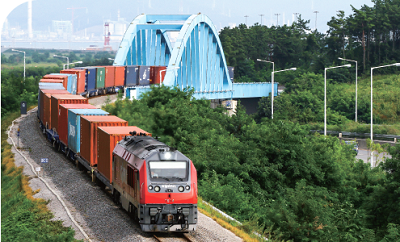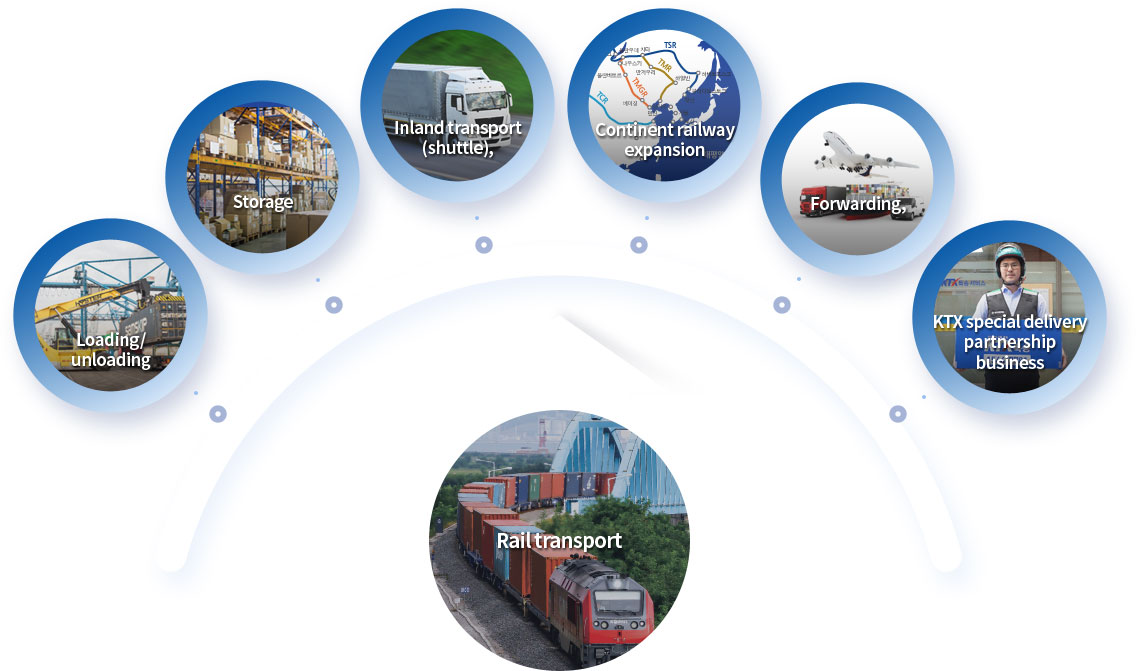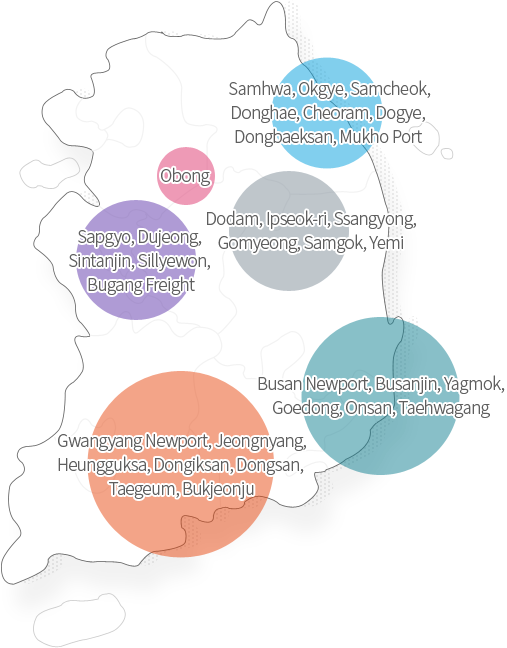Logistics Transport
KORAIL’s Logistics Business HQ
is making a leap forward to become a total logistics service provider which transports containers, cement, coal, steel, etc. and offers logistics related services such as loading/unloading, storage, and warehousing.
Railway logistics is energy efficient and eco-friendly, thereby gaining its importance more than ever. The energy usage per unit is 10.2% of cargo vehicles and the CO2 emission per unit is 12.0% of cargo vehicles.
In addition, large-scale transport is available at one go (above 1,000 tonnes); there are no traffic holdups that exists with roads, and the weather condition (snow, rain, wind, etc.) has very little no impact on train railway transport.
In addition, large-scale transport is available at one go (above 1,000 tonnes); there are no traffic holdups that exists with roads, and the weather condition (snow, rain, wind, etc.) has very little no impact on train railway transport.

Business Areas

History
| Year | Description | Year | Description |
|---|---|---|---|
| Oct. 2024 | Start of logistics train operation (Busan → Seoul) | Jun. 2024 | Launch of international multimodal transport business (OBong → Busan Port → China → Kazakhstan, Uzbekistan) |
| Mar. 2024 | Registration of logistics warehouse business (O Bong Station, Uiwang Station) |
Jan. 2024 | Operation of 40-car container freight trains with additional cars |
| Mar. 2023 | First introduction of wireless control inbound system (Jecheon Jochajang Station) |
Jul. 2022 | Trial operation of long freight train (Busan Newport → OBong) Registration of logistics warehouse business (Susaek Station) |
| Feb. 2022 | Registration of logistics warehouse business (Sinchangwon Station) |
Mar. 2021 | Registration of freight vehicle transport agency business (Daejeon) |
| Jul.–Aug. 2020 | Start of the Yeongilman Harbor Line operation (Pohang–Yeongilman Harbor Station) |
Jul. 2020 | Registration of freight forwarding agency business (Busan Customs) |
| Feb. 2020 | Registration of international logistics forwarding agency business (Daejeon) | Dec. 2019 | Introduction of running-type freight car measurement system |
| May. 2017 | Trial operation of long freight train (80 units) with wireless distributed control technology |
Apr. 2015 | Implemented logistics responsible business division |
| Oct. 2014 | Received Prime Minister’s Award (Korea Logistics Awards 2014) | Apr. 2014 | Launch of Korail Storage business |
| Mar. 2013 | Opening of South Cheol Songjang Station at Busan Newport | Jan. 2012 | Start of operation of Onsan Station sub-warehouse |
| Dec. 2010 | Opening of Bugchulsongjang Station at Busan Newport | Nov. 2010 | Decided/implemented green railway cargo mileage issuance |
| May. 2010 | Opening of new CY at Donghae Station | May. 2009 | Start of logistics warehouse operation (Taegum Station) |
| Dec. 2007 | Operated North-south cargo trains | Jan. 2007 | Start of logistics warehouse operations (OBong Station, Susaek Station) |
| Jul. 2005 | Started KTX special delivery service | Nov. 1997 | World’s first frozen and refrigerated container train operation |
| Jan. 1997 | Opening of the second terminal at Uiwang Inland Container Depot (ICD) |
Jul. 1993 | Opening of the first terminal at Uiwang Inland Container Depot (ICD) |
| Dec. 1977 | Completed construction of Busan/Yongsan station container yard |
Sep. 1972 | First container transport (Yongsan–Busan) |
KORAIL’s Freight Stations

1. Samhwa, Okgye, Samcheok
Donghae, Cheoram, Dogye
Dongbaeksan, Mukho Port
2.Obong
3.Sapgyo, Dujeong,
Sintanjin, Sillyewon,
Bugang Freight
4.Dodam, Ipseok-ri, Ssangyong,
Gomyeong, Samgok, Yemi
5.Gwangyang Newport, Jeongnyang,
Heungguksa, Dongiksan, Dongsan,
Taegeum, Bukjeonju
6.Busan Newport, Busanjin, Yagmok,
Goedong, Onsan, Taehwagang
| Items handled | Major stations |
|---|---|
| Cement | Dodam, Ipseok-ri, Ssangyong, Samhwa |
| Containers | Obong, Busan Newport, Busanjin, Ulsan Newport, Seohwaseong, Gwangyang Newport, Jeongnyang, Sapgyo, Bukjeonju, Yagmok, Gunsan Port, Heungguksa, Dongiksan, Bugang Freight, Dujeong, Sintanjin, Dongsan, Taegeum, Yeongju, Seokpo, Yeongilman Harbor, Anin |
| Coal | Goedong, Mukho Port, Cheoram, Dongbaeksan, Samhwa |
| Steel | Taegeum, Goedong, Sillyewon, Taehwagang |
| Oil | Onsan |
| Minerals | Yemi, Gomyeong, Donghae |